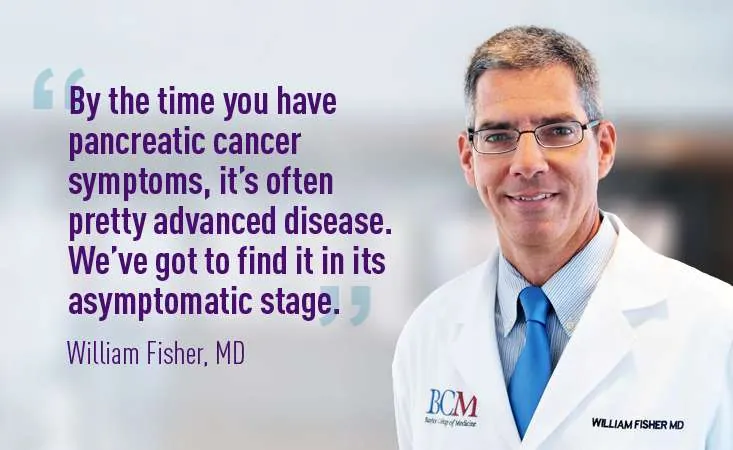
Surgeon's Breakthrough Insights into Early Detection of Pancreatic Cancer: The Future Looks Promising!
2024-10-29
Author: Ming
As a leading surgeon and the director of the Elkins Pancreas Center at Baylor College of Medicine, Dr. William Fisher is at the forefront of the battle against pancreatic cancer. He understands that the key to improving patient outcomes lies in early detection, which has historically been a significant challenge due to the subtle and often vague symptoms associated with this disease.
For years, Dr. Fisher has dedicated his research to finding effective strategies for early diagnosis. "I'm hopeful that we can gain valuable lead time in diagnosing pancreatic cancer," he asserts. Unfortunately, by the time symptoms present themselves, the disease is already often in an advanced stage. The challenge is to identify pancreatic cancer while it is still asymptomatic.
Recent advancements in cancer research have sparked a wave of optimism. Dr. Fisher mentions the rising involvement of private companies focused on developing cutting-edge tests aimed at identifying various cancers, including pancreatic. Innovations such as detecting circulating free DNA, analyzing saliva and stool for biomarkers, and exploring the microbiome's role in cancer detection are just a few of the exciting possibilities unfolding in this field.
But that’s not all! Dr. Fisher is also harnessing the power of artificial intelligence (AI) to revolutionize early detection. Traditional diagnostic methods often rely on radiologists examining CT scans for abnormalities that can be very subtle at early stages. In contrast, AI can process these scans with astonishing accuracy, sifting through pixels to recognize patterns and changes that may escape the human eye. "Imagine combining an affordable blood test for high-risk populations with AI-assisted imaging—this could truly change the game," Dr. Fisher explains.
One of the challenges, however, is identifying individuals at the highest risk for pancreatic cancer, particularly given its relatively low incidence rate. Dr. Fisher and a consortium of pancreas centers are investigating a novel approach: the diagnosis of new-onset diabetes as a potential indicator of increased pancreatic cancer risk. By analyzing electronic health records, researchers are tracking individuals over the age of 50 who receive a new diabetes diagnosis, monitoring them for three years to assess the likelihood of developing pancreatic cancer.
The preliminary findings are promising. The connection between new-onset diabetes and pancreatic cancer is particularly striking among non-Hispanic white individuals. Importantly, the timeline between diabetes diagnosis and cancer onset could furnish doctors with crucial opportunities for early intervention. Blood samples are being collected for analysis, aiming to establish potential biomarkers that could aid in predicting pancreatic cancer before its onset.
To further facilitate early detection, Dr. Fisher's team is innovating in participant engagement. They offer imaging consultations at patients' primary care facilities rather than requiring them to travel to the Baylor campus, thereby improving accessibility to necessary screenings.
Ultimately, Dr. Fisher remains committed to advancing pancreatic cancer care. "I would love to participate in something that leads to a successful early diagnostic test," he says, embodying the hope that while pancreatic cancer is one of the most formidable adversaries in oncology, the path toward earlier detection and better patient outcomes is becoming clearer.
Curious about the latest breakthroughs in pancreatic cancer research? Don't miss Dr. Fisher's insights during PanCAN's upcoming panel discussion on World Pancreatic Cancer Day. Sign up for the free webinar “How Early Detection Can Change the Course for Pancreatic Cancer” on November 21!


 Brasil (PT)
Brasil (PT)
 Canada (EN)
Canada (EN)
 Chile (ES)
Chile (ES)
 España (ES)
España (ES)
 France (FR)
France (FR)
 Hong Kong (EN)
Hong Kong (EN)
 Italia (IT)
Italia (IT)
 日本 (JA)
日本 (JA)
 Magyarország (HU)
Magyarország (HU)
 Norge (NO)
Norge (NO)
 Polska (PL)
Polska (PL)
 Schweiz (DE)
Schweiz (DE)
 Singapore (EN)
Singapore (EN)
 Sverige (SV)
Sverige (SV)
 Suomi (FI)
Suomi (FI)
 Türkiye (TR)
Türkiye (TR)